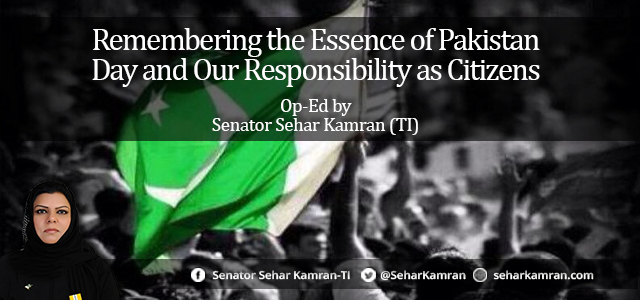OpEd by Senator Sehar Kamran(TI)
Mar 23, 2020
 “No constitutional plan would be workable in a country or acceptable to the Muslims unless it is designed on the following basic principles, namely, that the geographically contiguous units are demarcated into regions which should also be constituted, with such territorial readjustments as may be necessary that the areas in which the Muslims are in a majority as in the North-Western and Eastern Zones of India should be grouped to constitute independent states in which the constituent units shall be autonomous and sovereign….”
“No constitutional plan would be workable in a country or acceptable to the Muslims unless it is designed on the following basic principles, namely, that the geographically contiguous units are demarcated into regions which should also be constituted, with such territorial readjustments as may be necessary that the areas in which the Muslims are in a majority as in the North-Western and Eastern Zones of India should be grouped to constitute independent states in which the constituent units shall be autonomous and sovereign….”
81 years ago, these were the words which formed the basis of the famous resolution, later came to be known as the ‘Pakistan Resolution’, on 23rd March, 1940. During the 27th annual session of All India Muslim League held under the Chairmanship of Quaid-e-Azam Muhammad Ali Jinnah, the resolution was moved by the Chief Minister of Bengal Maulvi Fazal-ul-Haq and seconded by Chaudhri Khaliq-uz-Zaman. It was unanimously accepted. It was a watershed moment because for the first time in the history of the region, the majority of the 80 million Muslims living in the Sub-Continent called for the establishment of a separate nation, and the calls for a separate electorate changed into a quest for an independent homeland, where they could live freely and practice their beliefs in the manner they chose.
Originally called the Lahore Resolution comprised of five paragraphs, and each was a sentence long. Amon the lesser known facts about the resolution is that it was passed on 24th March, 1940 and was presented on the 23rd. The name Pakistan was nowhere mentioned in the resolution, in fact, the term ‘Pakistan Resolution’ was given by the hostile Hindu press following this convention. The Muslim League adopted it and thus Lahore Resolution came to be known as the Pakistan Resolution.
The founding fathers of the country shared a vision of a pluralistic, egalitarian, peaceful, and prosperous homeland, where all citizens would be treated equally irrespective of their religion, cast, culture, and background. This was even mentioned in the Lahore (Pakistan) Resolution which stated, “Adequate, effective and mandatory safeguards should be specifically provided in the constitution for minorities for the protection of their religious, cultural, economic, political, administrative, and other rights.”
It was only because of Quaid-e-Azam Muhammad Ali Jinnah’s will and determination that Muslims of the Subcontinent were able to achieve Pakistan only after seven years, in 1947. It was Jinnah’s farsightedness that he foresaw what would happen if Muslims lived under a Congress-led Hindu majoritarian government.
Today, we see in India how Muslims are being treated as second class citizens by the RSS-inspired Hindu nationalist government. How their rights are being curbed and an organised state brutality is being unleashed against them, just because of their religion.
The plight of the people of the Indian-held Kashmir must also be remembered. Kashmiris have been in a state of forced lockdown and curfew since August 5, 2019. The Indian government’s highhandedness in dealing with the people of Kashmir has even made its former allies admit that perhaps their ancestors made a wrong choice in ceding with India. As the Former Jammu and Kashmir Chief Minister Mehbooba Mufti in an interview said, “We have been let down by the same nation we ceded to” and that “it seemed as though the state had made the “wrong choice” in aligning with India rather than Pakistan during partition in 1947.”
Despite the naysayer’s, Pakistan became a reality and will continue to exist until the world does. Undoubtedly, the country faces a myriad of internal and external challenges, but as history bears witness, we as a nation have the ability to defy the odds and emerge successful.
As we are aware that world is currently facing an outbreak of the deadly COVID-19 pandemic. Without any globally available antidote or vaccine, this virus infection has the ability to wreak havoc on the global economies and the way people lead their lives all around may also change forever. The complete financial and political repercussions of this pandemic will only come to the forefront after it is over, but undoubtedly it has already shaken the foundations of the global economic system and exposed the world’s lack of preparedness to fight a deadly disease. Pakistan, too is in the throes of this pandemic with cases increasing exponentially by every passing day.
We as citizens can prevent and fight off this virus by adopting our founding father Quaid-e-Azam Muhammad Ali Jinnah’s motto of ‘Unity, Faith and Discipline.’ The people of Pakistan are resilient and have successfully faced many extreme challenges, and this infection too requires unity and cooperation from the people. As a nation we must act responsibly and commit to our national duty of adopting preventing measures like self-isolation, and keeping the vulnerable segment of society safe. On this Pakistan Resolution day, we must adhere to the principles of Jinnah and defeat this pandemic by acting as responsible citizens and adopting cautionary steps. If we stay united and resolute, we can emerge victorious.
The writer is the founder and Patron in Chief of a non-partisan think tank; the Centre for Pakistan and Gulf Studies (CPGS), she is a prominent politician, academician and practitioner in the areas of regional, international defense and strategic studies. She has served as an elected Member of the Upper House of Parliament of Islamic Republic of Pakistan from 2012-2018, until May 2019 she was the Member Senate of Pakistan Forum for Policy Research (SFPR). She has also remained the member of Senate committees on Defence, Foreign Affairs, Human Rights and the convener of the Pakistan-Saudi Parliamentary Friendship Group at the Senate of Pakistan. Twitter @SeharKamran


